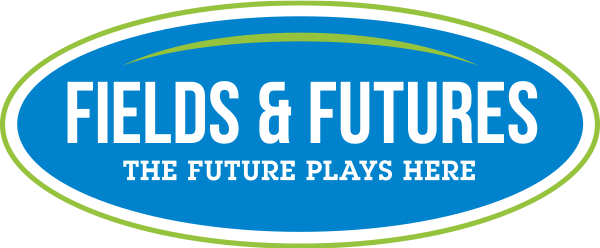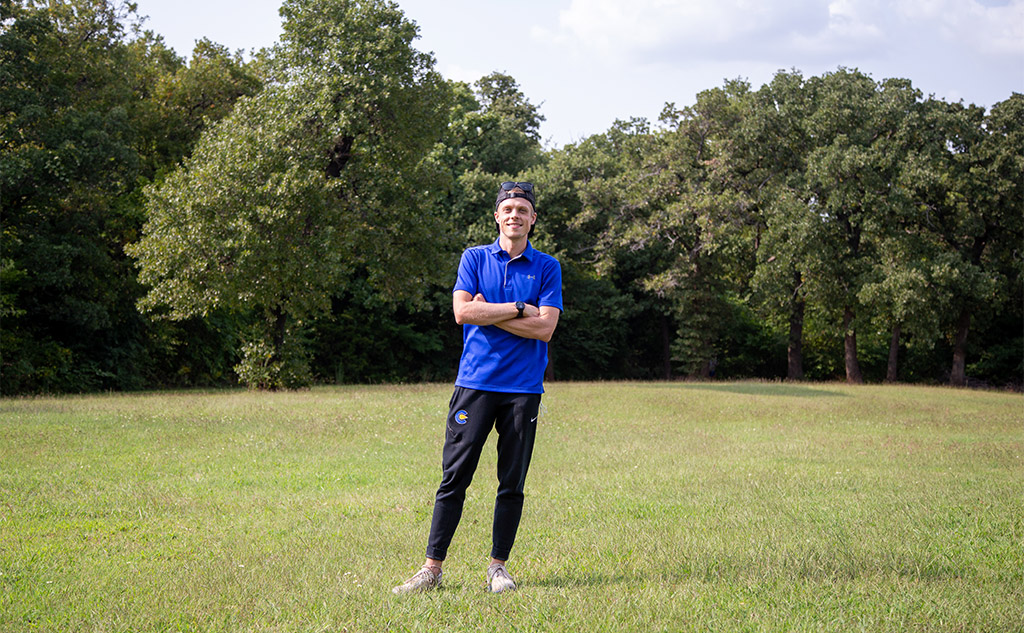In 2012, when we built our first field for Oklahoma City Public Schools, we did so with the belief that sports can have a life-changing impact on young people. Starting with that field, our vision was to put kids on a better path to graduation by changing the district’s sports culture from the ground up.
In eight short years, we have seen schools, communities, and an entire city join in this mission.
But even though quality athletic fields play an important role in the cultural shift we are experiencing, the magnitude of this movement would not be as powerful were it not for administrators and coaches who are selflessly committed to being a positive, dependable presence in the lives of OKCPS student-athletes.
One of those coaches is Carsen Moon, the head coach of the Classen SAS High School at Northeast cross country team.
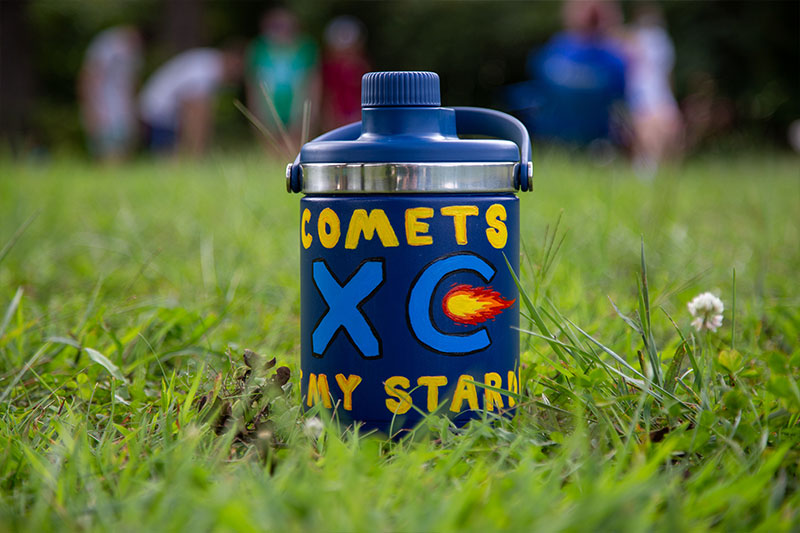
Comets and Moon Collide
In 2016, Moon left a job in finance to pursue a more meaningful career as a math teacher. While teaching Precalculus, AP Calculus, and AP Statistics at Classen School of Advanced Studies, he discovered the school’s cross country team and quickly became the Comets XC head coach.
He may be just a few short years into his tenure, but Coach Moon has already helped his program navigate the transition to a new campus and is currently leading his athletes through a pandemic that threatens to derail a promising season.
But in the true spirit of a cross-country runner, Coach Moon isn’t intimidated by the road ahead. Despite the challenging terrain, he has managed to grow participation and is finding innovative ways to keep his teams connected and moving forward.
When did you realize you were meant to be a coach?
I began running after graduating from college. To me, running represented freedom. It gave me confidence. It gave me such an important connection between my mind and body. That same year, I quit my job in finance to pursue a more meaningful career and become a math teacher. I befriended the former Cross Country head coach and immediately took an opportunity to volunteer with the team. From day one, coaching felt right. Spending my time running with my students while helping them to appreciate the sport and recognize their true potential? Life doesn’t get much better than that.
What is your favorite thing about being a coach?
I think I am as much a cheerleader as a coach. By far my favorite thing is revealing to each athlete their own strength and abilities. Seeing their smile when they finish their first race, or when they break 19 minutes in a 5k, or when they finish their first ten-mile run—you can’t put a price on that. The kids also keep me young, which is an added perk.
“From day one, coaching felt right.”
What is the most difficult thing about being a coach?
The most challenging thing about coaching and teaching is releasing control. It’s easy for me, my team, and my students to create goals but, ultimately, it’s the kids who are running the races and taking the tests. As a coach, you have to realize your job is not to win races. Your job is to teach and inspire kids to win their own races.
What has been your favorite or most memorable coaching moment?
In my three seasons coaching, I think my favorite moment was getting the results of our recent race in Norman. After that race, our boys’ team broke into the state Top 10 5A rankings and really proved they were a state competitor for the first time. It was a culmination of a long summer spent training hard and navigating the new COVID era of sports.
Did you have a coach that greatly impacted you or taught you something you still remember today?
My uncle, Barney Moon, was my tennis coach growing up. He is still a coach at Yukon. He taught me that coaches don’t need to be scary; that they should be smart, friendly, supportive, and sometimes goofy. He speaks respectfully and listens intently. His focus is on relationships. I see a lot of his strategies in my coaching.
What do you feel is your biggest responsibility as a coach?
My biggest responsibility as a coach is guiding my athletes to set and to achieve their own goals. In doing so, they begin to buy into themselves.
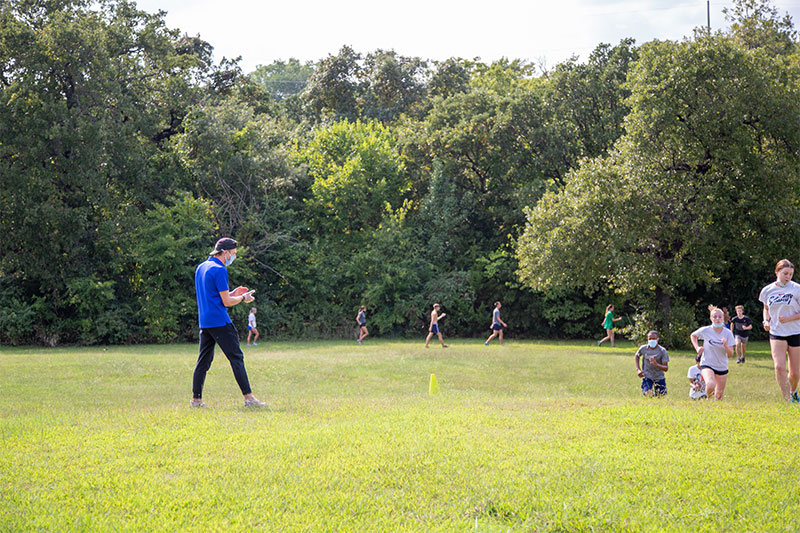
Do you believe new fields and facilities have a positive impact on a school’s student-athletes and sports programs? How?
I think new facilities encourage participation and inspire confidence in athletes. Perhaps more importantly, new fields and facilities show our student-athletes that someone is investing in their future. It shows a level of care that they may not find anywhere else.
Tell us about the first time your team played on a new Fields & Futures field.
When I coached Middle School baseball, we mostly played and practiced in city parks that were run down and mostly dirt. Our first time playing on a Fields & Futures field was game-changing. It made our athletes feel like they made it to the big leagues—they were immediately more motivated and serious about their play.
“As a coach, your job is to teach and inspire kids to win their own races.”
Your school recently relocated to a different part of the city. How did you navigate that move as a teacher & coach?
As a teacher and coach, I did all I could to bring my students together and create shared identities. Athletics was a critical piece to that. Football and basketball brought students together as players and fans. Ultimately, I think the move will allow the student body from each school to grow together. As our school grows, so do our opportunities.
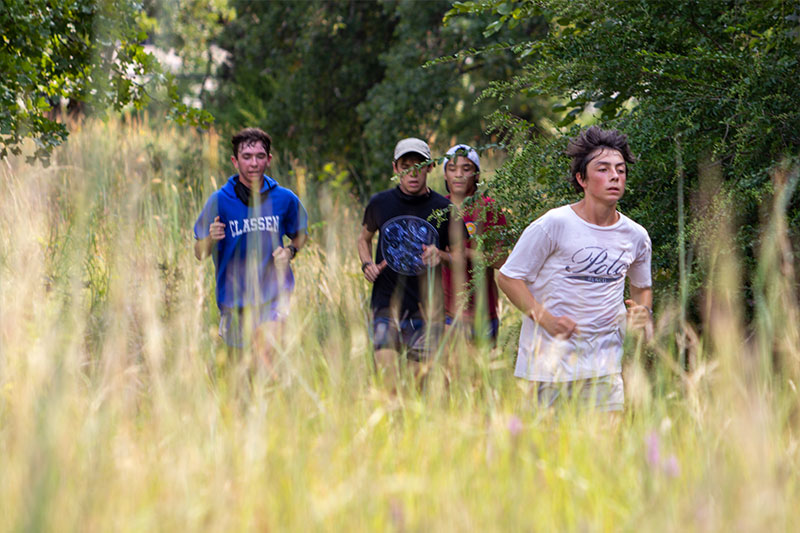
What are some ways you and your team are engaging your new community?
Our team recently adopted Lacy Park, a city park just north of the Classen SAS at Northeast campus. Once we get the green light to resume meeting as a team, we will be maintaining the park by cleaning up some dumped trash, glass, and building materials. Our goal is to become more ingrained in our nearby community—improving this park will finally give us a dedicated running trail while giving back to nearby neighborhoods.
How has COVID-19 affected you and your athletes?
Other than the new challenges of implementing typical safety measures—like masks, social distancing, no shared water—our season has lacked some of the social customs that our athletes have grown to love. It was not feasible to have pre-meet dinners as we’ve had in the past. Very few students ride the bus to meets, which previously fueled prerace camaraderie. COVID delayed our start date, canceled multiple meets, and has now put the season in jeopardy with the announcement that athletics is temporarily canceled. Our senior runners are crushed—this was going to be the first season our boys made it to State. But we can only control our training. We will stay hard at work in case we return to competition sometime late in the fall.
“New fields and facilities show our student-athletes that someone is investing in their future.”
How do you continue to prepare and motivate your athletes when there is no guarantee the season will continue?
From the time OKCPS closed last spring I was planning our Fall season. Most importantly I created a team Instagram named @comets_xc. Throughout June and early July, I posted daily workout videos and motivation for runners. They could message me with questions and I could give shoutouts to runners who were completing the workouts. I wanted to give them some sort of space online to engage and interact with the sport of running safely. Now that OKCPS has once again canceled athletics, we moved back to Instagram so I can continue to coach runners for a possible comeback at the end of the season. Each daily workout is dedicated to one of our runners—I hope that motivates them to complete it!
It really is a new era of coaching—we have to be open to using any channels necessary to get through to the kids. I think I’m too old to use TikTok, so I used Instagram.
Fields & Futures believes that sports help kids realize their purpose and potential. What is one thing that people may not realize about the kids you teach and coach?
Our kids have experienced unprecedented loss due to the COVID crisis and they are struggling to cope with our changing world. They feel lonely. They feel overwhelmed. They do not have access to their normal social supports. I believe our team has helped them have some sense of normalcy and has given them the social encouragement so many of them need.
How important do you feel the Simon Greiner Track & Field Program is to the advancement of running sports in OKCPS?
It is such a special opportunity for our team! Real running shoes are expensive. Giving OKCPS students resources that they otherwise would not have access to increases their motivation to run, prevents running-related injuries, and allows them to compete on the big stage.
In what ways is the Simon Greiner Track & Field Program impacting the running sports culture across OKCPS?
I believe it has helped to level the playing field of Cross Country competitions. It has opened doors to the sport that were previously closed to many young athletes.
Why is it important to have supporters like Don and Shellie Greiner who are willing to invest in the district and its student-athletes?
OKCPS has a high number of students who lack access to the resources that many students take for granted. Don and Shellie’s contributions show our kids that someone cares. These contributions give our kids hope that their success in sports is dependent on their heart and work ethic, not their ability to buy expensive things.
How have your cross country teams benefited from the Simon Greiner Track & Field Program?
When we got our racing and training shoes, our team immediately felt more empowered. Our athletes became more serious about our training and our races. I think the shoes and the support sparked renewed interest in running.
